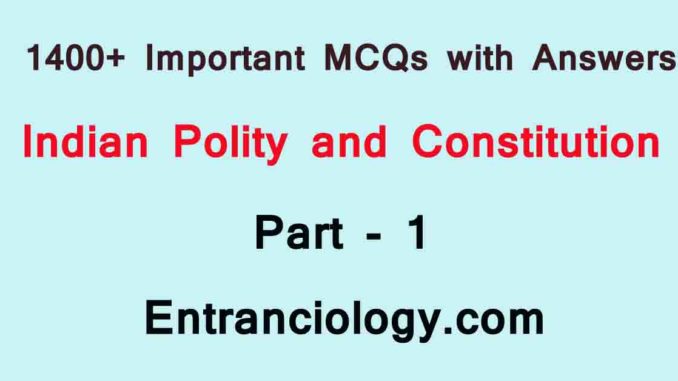
Q.1:- How many types of writs can be issued by the Supreme Court? (SSC Section Officer (Audit) Exam 2008)
- Two
- Three
- Five
- Six
Q.2:- How many members of the Anglo-Indian community can be nominated by the Parliament? (SSC SAS Exam 2010)
- 1
- 2
- 5
- 8
Q.3:- What is the time limit given to Parliament to pass the ordinance promulgated by the president of India? (SSC (10+2) Level Data Entry Operator & LDC Exam 2012)
- 6 days
- 6 weeks
- 6 months
- 6 months and six weeks
Q.4:- Appointments for all India services are made by (SSC CGL Tier-I(CBE) Exam 2016)
- UPSC
- President
- Prime Minister
- Parliament
Q.5:- Which of the following state has bicameral legislature? (SSC CGL Tier-I (CBE) Exam 2016)
- Tamil Nadu
- Punjab
- Sikkim
- Jammu and Kashmir
Q.6:- Comptroller and Auditor General of India is appointed by the (SSC (10+2) Level Data Entry Operator & LDC Exam 2013)
- Prime Minister
- President
- Finance Minister
- Lok Sabha
Q.7:- Who of the following has not been an interlocutor on Jammu and Kashmir? (FCI Assistant Grade-III Exam 2012)
- M. Ansari
- Radha Kumar
- Shujaat Bukhari
- Dilip Padgaonkar
Q.8:- Which of the following States was first to adopt the panchayati Raj? (SSC CPO Sub-Inspector Exam 2004)
- Andhra Pradesh
- Bihar
- Gujarat
- Rajasthan
Q.9:- How many languages are contained in the Indian Constitution? (SSC Combined Graduate Level prelim Exam 2007)
- 18
- 22
- 16
- 12
Q.10:- How many schedules are there in the Indian Constitution? (SSC CPO SI, ASI Online Exam 2016)
- 8
- 10
- 11
- 12
Q.11:- The Environment (Protection) Bill was passed by the parliament of India in- (SSC CGL Tier-I Exam 2015)
- 1984
- 1972
- 1986
- 1981
Q.12:- Who had proposed partyless democracy in India? (SSC Combined Graduate Level Tier-I Exam 2011)
- Jaya Prakash Narayan
- Mahatma Gandhi
- Vinoba Bhave
- A. Dange
Q.13:- Who is empowered to transfer a Judge from one High Court to another High Court? (SSC Combined Graduate Level Exam 2004)
- Chief Justice of India
- President of India
- Law Minister of India
- The Union Cabinet
Q.14:- Article 370 of the Constitution is applicable to the state of: (SSC CPO Sub-Inspector Exam 2005)
- Nagaland
- Mizoram
- Manipur
- Jammu and Kashmir
Q.15:- Which of the following is an extra-constitutional and non-statutory body? (SSC Tax Assistant (Income Tax & Central Excise) Exam 2009)
- Finance Commission
- Planning Commission
- Union Public Service Commission
- Election Commission
Q.16:- Money Bills originate in the state Legislative Assembly on the recommendation of (SSC Combined Matric Level (PRE) Exam 2006)
- The Governor
- The Chief Minister
- The Finance Minister
- The Speaker
Q.17:- Who decides whether a bill is a Money Bill or not? (SSC Combined Matric Level (PRE) Exam)
- President
- Prime Minister
- Finance Minister
- Speaker of the Lok Sabha
Q.18:- How many readings does a non-money bill have in each House of the Parliament? (SSC CPO Sub-Inspector Exam 2007)
- Two
- Three
- Four
- One
Q.19:- According to Preamble, the ultimate power lies in the hands of: (SSC (10+2) Level Data Entry Operator & LDC Exam 2012)
- Parliament
- Constitution
- President
- People
Q.20:- Which of the following is a bulwark of personal freedom? (SSC Section Officer (Audit) Exam 2006)
- Mandamus
- Habeas corpus
- Quo-Warranto
- Certiorari


